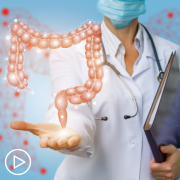Newly Diagnosed With Colon Cancer? Key Advice From an Expert
Newly Diagnosed With Colon Cancer? Key Advice From an Expert from Patient Empowerment Network on Vimeo.
Dr. Smitha Krishnamurthi, a colon cancer specialist from Cleveland Clinic, shares steps to take following diagnosis to ensure patients are receiving optimal care.
Dr. Smitha Krishnamurthi is a gastrointestinal medical oncologist at the Cleveland Clinic. Learn more about Dr. Krishnamurthi here.
See More From The Pro-Active Colon Cancer Patient Toolkit
Related Resources:

Your Colon Cancer Care Colon Cancer Toolkit: Office Visit Planner
|

|
Transcript:
Katherine Banwell:
What three key pieces of advice would you have for a patient who has just been diagnosed with colon cancer?
Dr. Krishnamurthi:
Okay. Yes, when somebody received a diagnosis of colon cancer, of course it’s a very serious diagnosis. I would always encourage patients to seek out expert care. Meaning see a person who specializes in treatment of colorectal cancer. So, a colorectal surgeon and a colorectal medical oncologist. I am a medical oncologist who specializes in treatment of patients with gastrointestinal cancer.
These sorts of specialists are typically found at high-volume cancer centers. Look for National Cancer Institute-designated comprehensive cancer centers. That designation implies very high quality of care and that there’s a lot of basic science research, clinical research, and what we call translational research. Like trying to bring lab discoveries to the bedside. I would encourage that for everybody. Of course, not everyone lives near such a center, but what we’ve learned through the pandemic is that we can use telemedicine far more than we ever did before.
We do a lot of virtual visits with patients who may live many hours away. I think it’s important, even if you have one visit for a second opinion, a treatment plan, that you could then receive that treatment with the local oncologist. I think that’s very helpful, and I would encourage everyone to seek out an expert opinion.
Also, I think it’s very important to seek out as much support, because this is a major diagnosis and a lot to go through. There is a lot of support out there that people may not be aware of besides, of course, family and friends. There are excellent patient advocacy groups and groups like your organization, trying to bring information to patients. Patients can ask their doctor or nurse about what’s local in terms of support groups, but there are also large internet presences by patient advocacy organizations. They are giving people high-quality, evidenced-based recommendations, advice.
People get to learn from other peers who have gone through treatment. I can’t name them all, but just for example, like the Colon Town and Colorectal Cancer Alliance. I believe just launching today is My Bluem, B-L-U-E-M.org.
I happen to be executive board member of that, so full disclosure. But it’s an organization created by colorectal cancer survivors for patients to come to one website to access information about all of these different organizations. There is a huge community out there for people who are diagnosed with colorectal cancer. The third piece of advice, I would just say when you’re looking for information, make sure it’s from a reliable source like these patient advocacy organizations. I tend to look myself for websites that end in .org, .gov, .edu, and also .net.
Our American Society of Clinical Oncologists organization is ASCO.net, where you can get great advice about cancers. Cancer.gov, cancer.org. Because the internet is full of suggestions which may not be based in good science.
It’s important to have a good source.
Katherine Banwell:
Good advice. Thank you for that.






